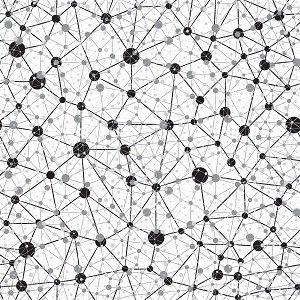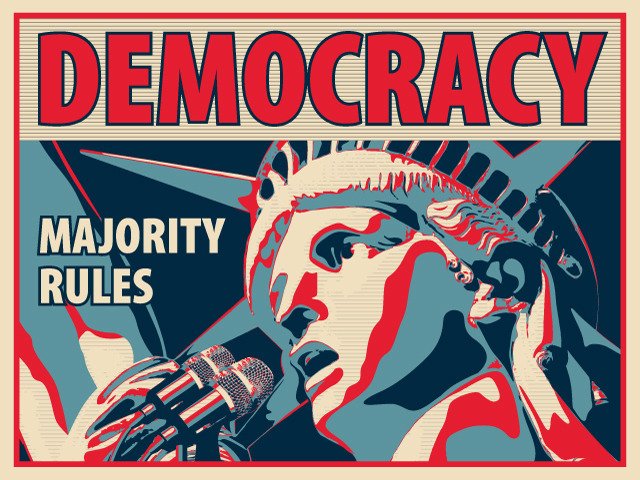Because of steemit I haven’t been able to properly fall asleep for some time, as ideas keep popping up. Instead of letting the valuable info slip through the crack as I would when I was only on Facebook and Reddit, I want to hold on to these ideas, so that I can write some interesting content later on.

This night (it is 2 am now in Amsterdam, well past my normal bed-time), I was thinking about democracy. Lately, my mind has been occupied by cryptocurrencies and blockchain, so the two ideas had sex in my mind and the lovechild that came out is a vision for the future.
Associative Democracy
During my master’s degree in philosophy, in which I specialized in Political and Social Philosophy, there is one political theory that really grabbed my attention. It is called Associative Democracy and was developed, or rather made explicit, by Paul Hirst in the early ‘90s. The basic idea is that instead of universal laws within a political union (like national or state laws), we would create some basic rights and responsibilities that hold for everyone (right to life, health, happiness, freedom, rules like not interfering with these rights, traffic rules, etc.) and let people organize themselves into associations if they want to get something done (plant a forest, build a hospital, create an ongoing social structure, etc.).
It sounds quite abstract, but once I grasped the idea, it made complete sense to me. Within Associative Democracy, money would go to associations proportionate to their size, while everyone is free to join and leave any association. Here’s the mind-blower: No association holds any power over any other association. So when you have a religious association that wants their members to not use marijuana, or groups that tell their members to behave in a certain way, even if they are the majority, they cannot impose these rules to others, and members are free to leave whenever they want. This is precisely the point where our current democratic systems are broken: majority rule impinges on everyone's freedoms.

(not a good thing)
Generally within Associative Democracy taxation is still something that is centrally organized, but division is based on membership. If I am part of three associations, my share of the government budget is divided three-ways. Theoretically, one could object, that this engenders freeloading: why wouldn’t we start an association where we give all the tax-money back to the members. Traditionally the answer would be that people would want to start paying for roads and such when it turns out they are breaking down, and would become members of the road-building association (for example). But blockchain throws this all in the blender. What comes out is revolutionary.
Blockchain Technology and Society
What happens when you add blockchain to this idea, is that once people are not part of the road-maintenance association, they would be charged a fee for using the roads (this can either be lump-sum or on a case-by-case basis). So the amenities that society produces are protected, much like private property.
Blockchain could also smooth out the voting and taxation within society. We could give each eligible person 100 points which they can divide among different departments or associations. We wouldn’t have to have a liquid democracy type situation, where people vote on systems that apply to everyone, as their rights are protected from exactly this situation, but we could intertwine voting and budgeting to a large extent. For the centrally organized goods and services, money is definitely needed, but this can come about either through taxation (as per one of the rules of any association) or through fees applied to users. For other services, something similar holds, but the money goes to the association that invests in the goods or services.

Bitcoin/Blockchain is often connected ideologically to libertarianism. We all know that not every individual is a libertarian, and that some people like structure and some sort of social safety net. But what blockchain makes possible is that we have both. A safety net for those who want and a way for people to pay out of pocket for these things. Together with a form of associationalism we can build our society from the ground up, like installing a new OS, where we can program freedom to choose our own way of life into the system, instead of being dependent on whatever is being kicked down the mountain of shit in parliaments around the world.
Did you come up with this yourself? Me and my friend were talking about this yesterday. Nicely explained
Well, the ideas aren't new, but they are new to me. Writing things down helps me to think things through.
Is it because only a small fraction of the population will just use it and follow it without having a clue how it works...like the US government? :)
Rather than trying to polish the turds of technology and politics with more technology, I think it's a better idea to let control systems using man/Ai made rules crash, which will take those dependent upon them out when they go down.
I know this sounds horrible but agriculture, money, religion, and the hierarchy those unsustainable systems create is devolving humanity physically, mentally, and spiritually. Those man made rule systems place middlemen in between the people and their resources and anonymize the actions of the middle men in the process. This makes it possible for factories to sell chemical tainted meat year after year because the end users are so separated from the supply.
To make things worse, the slavery systems become like living beings with an instinct to survive and end up creating conditions that grow more slaves. This is why humanity is in the mess that it's in. The slavery systems have grown too many slaves, now something has to give.
I opt out of all associations and government and choose to meet my needs directly whenever I can. I don't want roads and I won't pay to drive on them, but when all of the land is owned and the only way to move freely is by the gaps in the fences that we call roads, how is their any freedom?
Democracy is stupid because most people are stupid. Any man made rule or resource distribution system will result in corruption because psychopaths don't care about man's rules and will ignore them, giving them unfair advantage.
When we rely upon Nature's rules, and live as nomadic, minimalist, hunter/gatherer/scavengers, like the rest of Nature, the only tool the psychos have is violence. Violence is easy to see and eliminate from the gene pool. A guy taking a few grand from another guy to put some poison in your water before he sells it to another guy, that then sells it to another guy, and then....and so on, is not likely to get noticed or caught whereas a psychopath singleton dumping fluoride in the community well would be an easy investigation to solve.
Civilization, living in cities and forming groups that decide how resources should be distributed and how people should live, disconnects people from the resources they need to survive and thus empowers psychopaths. Political systems remove personal responsibility from people's minds, turning them into exploited slaves that are dependent upon their slave masters.
In Nature's resource based economy, if the river is being over fished, you either fish less, move, or voluntarily reduce the size of your tribe through intelligent breeding practices. If a psychopath is born or raised, he's not going to make it very far before his tribe is sick of his crap and banishes or kills him. Nature's rules are not breakable and tend to sort things out in a sustainable way whereas man made rule systems are just power up schemes for the psychos that have been running the show since the dawn of agriculture.
Blockchain or not, as soon as some people decide that they have a plan that's better than the plan that allowed our species to survive a few mass extinction events, shit's going downhill in terms of freedom and sustainability.
Everything you learned in school was regarding these devolved slave humans and methods to control them. I'm postulating that if we dissolve all of the systems that detach humanity from Nature and community, that our species can begin evolving again.
Thanks for your reply. I don't agree with it, but it took me some time to phrase it. I guess it boils down to the idea that people WANT to collaborate on the goals they want to achieve. If we can design our society in such a way that such collaborations are promoted (unless they are impinging on other people's rights), I think it is a good thing.@apocaloptimisto
If you don't agree with everything I stated it's because you are uninformed. Every statement I made above can be backed by piles of scientific studies and quotes from the greatest thinkers Earth has seen. It's all fact.
I agree with the second part of your comment but I've never seen a collaborative effort consisting of more than 150ish people that doesn't impinge upon others' rights in some way or another. I'm not saying it's not possible though, just that I've never seen an example of a sustainable and ethical large collaborative effort.